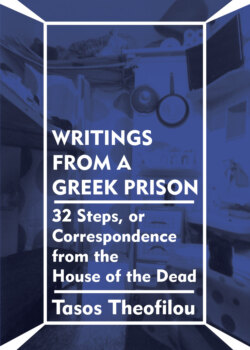Читать книгу Writings from a Greek Prison - Tasos Theofilou - Страница 11
На сайте Литреса книга снята с продажи.
Translator’s Note
ОглавлениеMy decision to translate this book stemmed from a feeling of emergency that bore in me as a reader. I find this is literature at its best, as the writer manages to depict society at its worst without resorting to an absolute rejection of what there is—it’s not a nihilist’s or pessimist’s approach, as one might have expected. Disarming humor, sensitivity, and violent reality are united in one single body. The bleakest aspects of life in prison are described with a sobriety that one would expect to find in a detached observer’s perspective. We see through thick walls. The spatial boundaries between “the in” and “the out” collapse. We’re all confined. We’re all subject to the very same restrictions regardless of where we might find ourselves—in prison or outside of it. The difference is in the intensity, the level of crudeness or sophistication. The rule of law, authority, and power are ruthless regulators of our behavior and the starting point of our battle against them is our awareness of this. We’re all potential transgressors. This is why I felt that this book was worth sharing with the wider English-speaking audience.
Language-wise, I’ve felt that the whole translation endeavor was a precarious journey amidst the linguistic traps of the various “English-es” and English as an international language. Defining the audience was, in reality, impossible as I had no idea if, where or when the text would eventually be published. Should I make use of prison lingo equivalences that are found in prisons of a specific English-speaking country? Should I approach it from an international reader’s perspective? But then again, there’s no international version of English prison lingo, and the average reader is likely not familiar with their own country’s prison slang.
The dictionary was the part I had to revisit over and over again. In the end, I resigned myself to the fact that this part of the book had to live up to the title it bears: it’s a peculiar dictionary and its prime goal is to acquaint the reader—native English speaker or not—with the linguistic environment of Greek prisons without reducing its value as a piece of literature. The gap between the two types of discourse had to somehow get bridged. For this reason, I deemed it necessary to provide a simple phonetic script, both the literal and figurative meanings when needed as well as—more rarely—an English prison lingo alternative with an explanation. I hope the reader will find it enjoyable and informative despite the linguistic restrictions and the loose lexicographical style.
I would like to thank the writer, Tasos Theofilou, for discussing all the points that gave me trouble and contributing additional notes specific to the English-language version of his book. Special thanks to Christina Morrison and Christopher McCabe for their invaluable feedback. Many thanks to my good Hanoian friends from Đội Cấn Street, Catherine Tomkins, Anemi Wick, and Linh Chi for being there.
In solidarity with Tasos Theofilou. In solidarity with all the political prisoners in Greece and elsewhere.
For a (prison-) free society.
Eleni Pappa
December 2016
Hanoi, Vietnam
